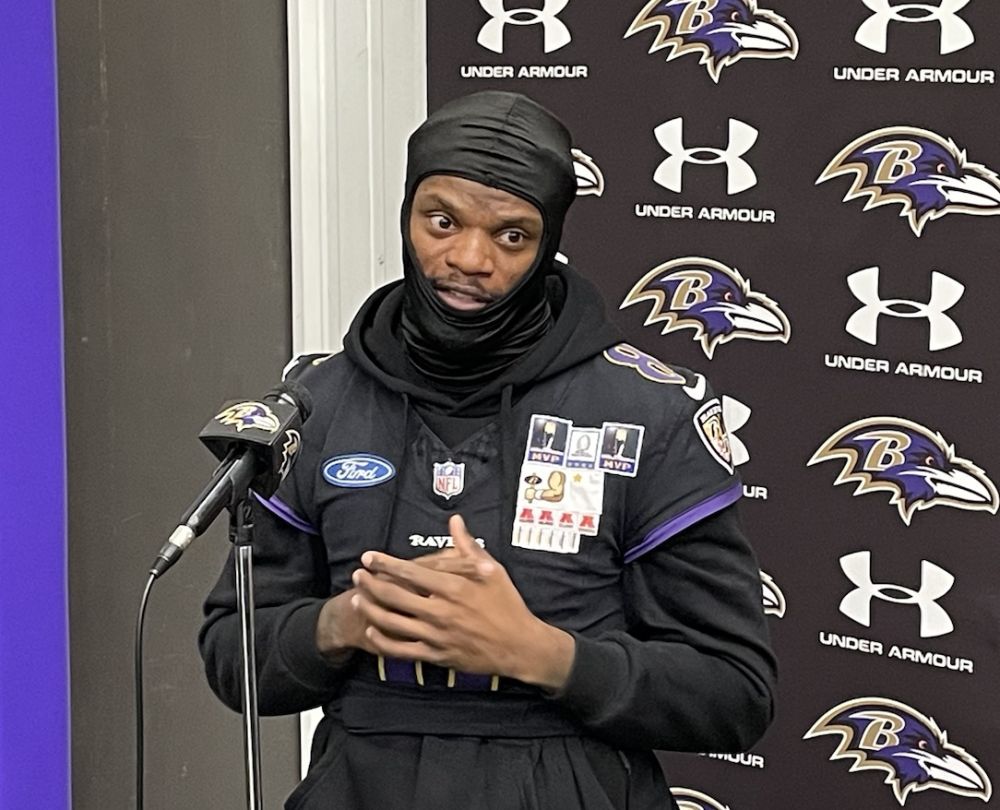The question was always simple for the Ravens in a negotiation that’s been anything but that.
At an impasse with star quarterback Lamar Jackson after more than two years of unsuccessful contract talks, what does Baltimore hope to accomplish in using the franchise tag?
Yes, the exclusive tag would have prevented Jackson from negotiating with other teams, but what was that really worth to general manager Eric DeCosta beyond a higher cost than the $32.416 million non-exclusive version they chose? Was that approach going to improve the odds of working out a long-term agreement sooner than later or simply prompt Jackson to dig in his heels even harder without an ability to explore his market worth?
Is total control worth as much as finding a solution when each side has a fair viewpoint?
Statement from GM Eric DeCosta: pic.twitter.com/LOnW8XpPL5— Baltimore Ravens (@Ravens) March 7, 2023
Using the exclusive tag made sense if trading the former NFL MVP felt like the inevitable — or even desired — outcome to this saga, but it certainly wasn’t going to be a catalyst for speeding up negotiations for a long-term agreement. There’s also the matter of what a projected $45 million salary for Jackson would have meant for Baltimore’s 2023 salary cap and roster construction without any assurance of when the 26-year-old would show up to play anyway.
Risky as it could be, using the non-exclusive tag is an attempt to force action — one way or another. After disagreeing with the Ravens about his value for so many months, Jackson now has an opportunity to see what other teams think. And while the baseline cost of a suitor surrendering two first-round picks is attached to his steep asking price, this is as close to free agency as Jackson could have reasonably hoped to be at this point.
Theoretically, the two-time Pro Bowl quarterback can prove Baltimore wrong about his value by signing a superior offer sheet that forces the organization’s hand, or he’ll learn the Ravens’ best offer wasn’t as bad as he thought. Of course, that’s ignoring accusations of NFL owners colluding, which figure to be very difficult to prove even if Jackson and the NFL Players Association are willing to make that fight. There’s also the potential for teams simply not wanting to waste time and resources negotiating — with a player who still doesn’t employ an agent, mind you — if they believe an offer is very likely to be matched by Baltimore anyway.
That's a very real thing. When was an agent & had RFAs, I used to hear from teams they didn't want to do someone else's deal for them. https://t.co/5gu1SuS9X1— Joel Corry (@corryjoel) March 8, 2023
The same potential drawbacks — such as questions about how Jackson’s playing style will age on the heels of him now missing nearly 12 full games the last two seasons — with which the Ravens have wrestled in valuing Jackson are still there for other teams too. Despite what social media might suggest, one can believe Jackson is both a terrific player and too risky to fully guarantee a contract.
Understanding the danger of losing a transcendent talent at the most important position on the field for only two first-round picks and how that would be received by a fan base already restless from this standoff, DeCosta and the Ravens certainly didn’t make the non-exclusive decision blind. You only dare proceed down this path with a high level of confidence in your projections of Jackson’s market and your ability to match any number of potential offer sheets from various suitors. It’s also worth noting the non-exclusive tag doesn’t eliminate the potential for a trade to avoid the offer sheet process altogether if the situation comes to that.
Still, it takes only one team putting together an unexpected contract structure to put the Ravens in a losing — and embarrassing — position. Just ask Atlanta and New Orleans, who were the “finalists” in the Deshaun Watson sweepstakes last March until Cleveland dropped a five-year, $230 million guaranteed contract into the quarterback’s lap.
To be clear, risk exists beyond the chance of losing Jackson to another team when free agency opens next week, and that would have been true with the exclusive tag too.
It remains to be seen how Jackson will respond to being tagged, especially if it doesn’t result in an offer to his liking. Would that prompt him to finally accept the Ravens’ best long-term deal or continue playing hardball with eyes toward 2024 and doing this all over again next offseason? Especially with Baltimore only being obligated to pay him a below-market $32.416 million on the non-exclusive tag for the upcoming season, could he forgo signing well into training camp or even the regular season?
After playing out his entire rookie contract and receiving the cheaper franchise tag, is Jackson now determined to play only at his asking price moving forward?
Given the apparent disconnect between Jackson and the Ravens over the handling of the knee injury that sidelined him for the final six games of last season, might he desire a fresh start elsewhere? How might much of the ongoing negative reaction — fair or unfair — from media and players around the league influence his attitude toward the only NFL organization he’s known?
Other than through social media channels often open to interpretation, Jackson hasn’t spoken publicly since before that Dec. 4 game against Denver, so it’s difficult to gauge where he truly stands on the franchise tag and his future with the Ravens. Perhaps he’ll break his silence before the start of the new league year, or we’ll simply continue to wait and wonder as we have through most of this process.
At the very least, the Ravens using the non-exclusive tag forces some action in hopes of a solution that works for both sides. After more than two years of failed negotiations, it was something that was probably necessary, especially if you still want to see Jackson and Baltimore together for the long haul.























